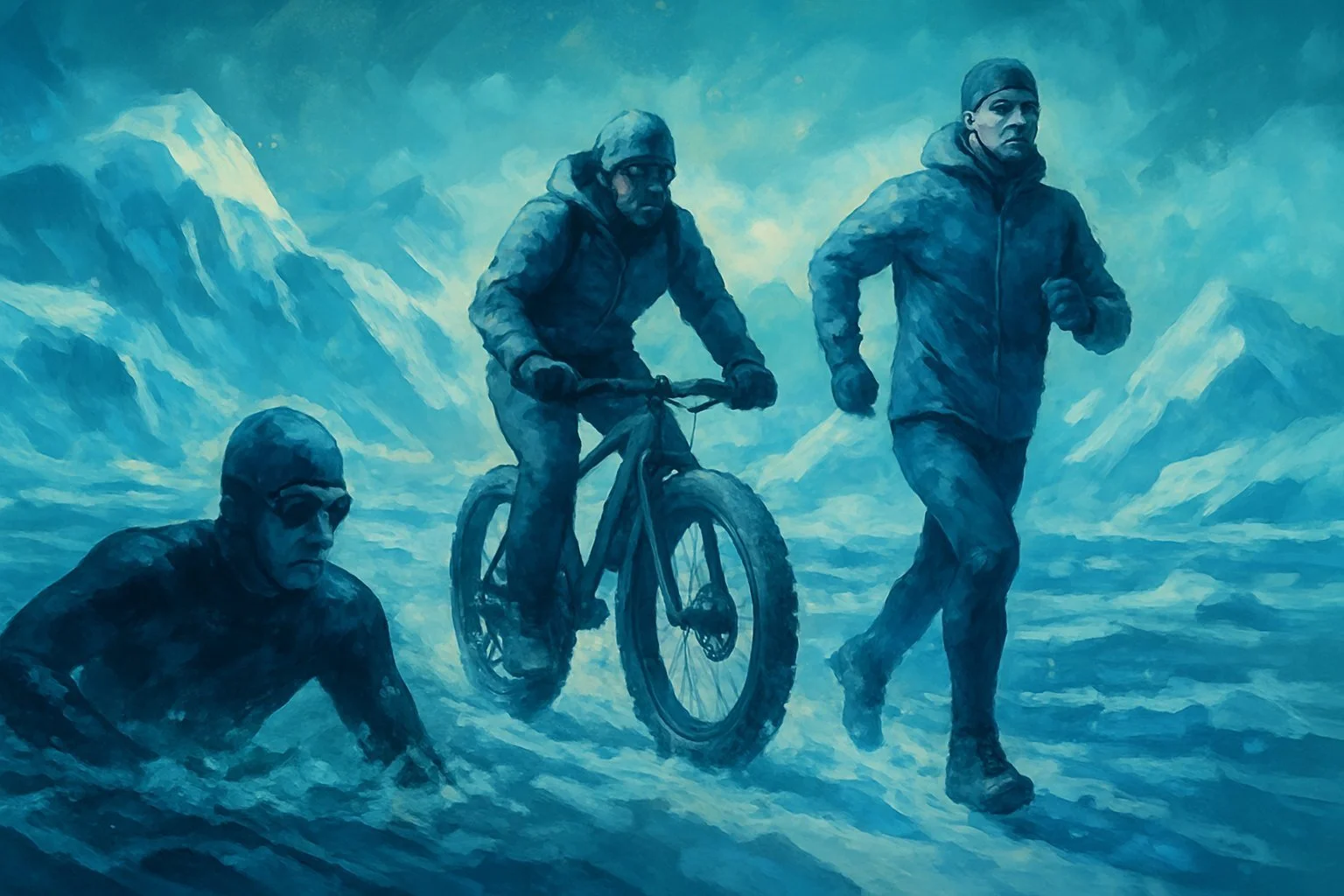Project Iceman: One Intrepid Human Takes on Antarctica
Introducing Anders Hofman and his film Project Iceman. This documentary doesn’t simply showcase the first person in history to attempt an Ironman-distance triathlon in Antarctica. It pulls you into the internal friction of doing something no human body is designed for, and it asks bigger questions along the way about purpose, obsession, and the strange places where growth actually happens. And maybe that’s why it lingered with me. Because Antarctica isn’t just a backdrop, it’s a mirror.
The Attempt: Swim. Bike. Run… in the Coldest Place on Earth
Anders heads to Antarctica armed with a conviction most people would write off as naive ambition. Complete a 2.4-mile swim, 112-mile fat bike ride, and a 26.2-mile run in an environment where water itself is hostile. Even the logistics feel absurd. Swimming in sub-freezing water protected only by layers of neoprene and willpower. Biking around the clock through deep and unstable snow, and winds that can peel paint off metal. Running a full marathon on terrain that twists and swallows your legs whole. It’s part impossible feat, part spiritual vision quest, and part extended therapy session performed in front of cameras.
What hooked me wasn’t the “can he do it?” tension. It was watching the way everything becomes harder than anticipated. The plans, the gear, the weather windows, the mental resolve. Antarctica is the ultimate anti-comfort zone. You don’t bend it to your goals. It bends you…or breaks you.
Where Ambition Meets Human Limits
You can’t watch this and not think about your own edges. Those moments when you’re convinced you’ve hit your limit, only to find a sliver of space just beyond it. Anders internal dialogue becomes strangely familiar to many of us.
Why am I doing this?
What exactly am I trying to prove?
Is this my purpose or my projection?
And, my personal favorite, what happens when your identity is tied to the thing that’s breaking you?
There’s something beautifully messy about watching a hyper-driven athlete crack open, regroup, and reassess in real time. Most documentaries sanitize that part. Project Iceman lets the camera sit in the discomfort.
As someone who has lived much of life in the high-output mode (balancing family, endurance training, business, and the constant pressure to hold everything together) the rawness resonated. That dance between pushing boundaries and respecting your humanity. It’s a fine, blurry line.
Antarctica as a Teacher
In this film, Antarctica becomes a character of its own. Cold, indifferent, ancient. No opinions. No judgment. Just truth. It doesn’t reward strength, it rewards humility.
It doesn’t care how fit you are or how many followers you have. No interest in disappointed sponsors or what your personal narrative arc is supposed to be. The ice has no appetite for curated ambition. Antarctica feels like the last place where ego has nowhere to hide.
Watching Anders repeatedly humbled by weather, by logistics, by his own physiology, reminded me of what the wilderness has taught me again and again. Nature isn’t something to conquer, it’s something to fully immerse yourself in and deeply respect. It’s an environment that offers you a chance to meet yourself without the noise.
The Real Story Isn’t the Triathlon
Yes, the athletic feat is remarkable. Yes, the scenes are stunning. And yes, the whole journey pushes the edges of what a human can physically endure. But I believe the real story is the interior one. The vulnerability of suffering and failing in public. The courage to keep moving when certainty collapses. The honesty of admitting that the point of a challenge often ends up changing in the end. The quiet realization that these big efforts aren’t about heroism, they’re about clarity.
In that sense, Project Iceman is less about Antarctica and more about the gnarly mindscapes we all traverse. Doubt, resolve, reinvention, and the strange pull of calling. Maybe the value of watching someone attempt the impossible is not in the accomplishment, but in the way it reminds us of our own latent possibilities, the ones waiting quietly beneath the surface, asking to be explored. Call it education. Call it inspiration. Call it magic.
About UP:
Promoting quality content that cracks open the mind and sparks curiosity. Standing Cyclist presents Useful Possibilities (UP), spotlighting extraordinary teachers and leaders, athletes and activists, researchers and writers, filmmakers and engineers, and their groundbreaking projects. UP recognizes individuals and teams who raise awareness and drive innovation in areas such as health and wellness, environmental science, spirituality, personal growth, and human rights. We celebrate those who promote unity, tolerance, respectful collaboration, mindful living, and the [responsible] use of technology, social media, and modern marketing tools. Honoring people and content that inspire us to be the very best versions of ourselves.









